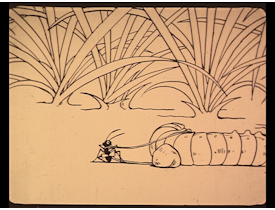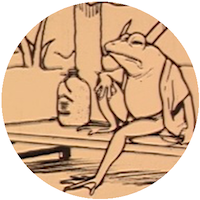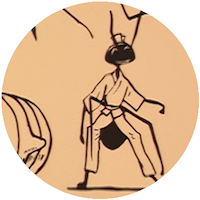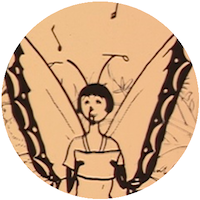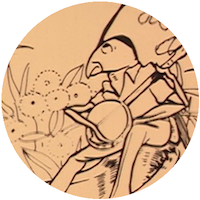Two Worlds
| Original Title | 漫画 二つの世界 |
|---|---|
| Japanese kana Rendering | Manga Futatsu no sekai |
| English Title | Two Worlds |
| Production Date | 1929 |
| Author | Yasuji Murata |
| Duration (minutes) | 15 |
| Sound | silent |
| Color | b/w, tinted |
| Plot | On a summer day, father and son ants are carrying a large caterpillar. An old toad, already drunk in the daytime, teases the ants for their hard work. A young grasshopper and a butterfly are having a sumptuous meal while listening to music. Watching the ants dragging the caterpillar, the grasshopper and the butterfly mock the ants with grimaces. The ants take rest at home. While a daughter ant is busy washing a kimono, the grasshopper plays a banjo, with the butterfly dancing to the music on a table. The father ant admonishes his son, who envies the grasshopper and the butterfly, quoting a proverb, "Summer fun leads to a winter of misery." The summer gives way to autumn and then comes winter, when cold breezes blow. The ant family is spending time together in a warm home. The son ant beats the father in arm wrestling. The grasshopper, wearing ragged clothes and walking with a cane, begs for food through the window. The daughter ant says that the butterfly is bedridden. The old toad is also seriously ill. The father ant quotes the proverb once again: "Summer fun leads to a winter of misery." |
| Description | This is the first Ministry of Education movie created by Yasuji Murata, whose works had been released by Yokohama Cinema Shokai. Murata had created his previous film A Frog is a Frog (1929) based on Aesop's Fables. This movie is also based on Aesop's fable The Ant and the Grasshopper. The following comment is in the description of the movie by the Ministry of Education: "This highly educational animation shows the meaning of the proverb 'Summer fun leads to a winter of misery' in an interesting way, emphasizing the importance of diligence. The film contrasts the lifestyle of hardworking ants and that of a lazy toad, a grasshopper and a butterfly." In contrast to the western lifestyle of the easy-going grasshopper and butterfly, the ants lead a purely traditional Japanese lifestyle. Also, the delicate cutout animation technique used for the insects' legs and antennas has highly expressive capabilities (Murata's animation skills were described as "extraordinary" in advertisements at the time). We can also appreciate the beauty of the blue-dyed prints for winter, which stand in contrast to the summer scenes. This work was publicly distributed for a relatively long period of time as a movie produced by the Ministry of Education. A talkie version was also subsequently released. The following article was found in the news column of the magazine Eiga Kyoiku issued in November 1929: "An educational film created by the Ministry of Education distributed nationwide / The following three educational movies that are being produced by the Ministry of Education have been completed: Nation Where the Sun Rises (3 volumes), which aims to cultivate the national spirit, Wake Up People (2 volumes), which aims to improve the national economy, and Two Worlds, an animation designed to recommend hard work. Screened at the Minister of Education's official residence on October 7, these movies were reviewed at the Imperial Household Ministry by the Emperor on October 8 and also by the cabinet on the same day. The Ministry of Education has decided to distribute these films free of charge to prefectures as well as to the six metropolitan areas to use them for the education of the entire nation." (p. 29) |
| Production Company | the Ministry of Education |
| Distribution | |
| Release Date | |
| Credits: Director | Animation: Yasuji Murata |
| Credits: Staff, Cast, etc. | Supervise: Chuzo Aochi |
| Intertitles | T1: Two Worlds T2: Produced by the Ministry of Education T3: Supervised by Chuzo Aochi / Animation by Yasuji Murata T4: That's some banquet you have! T5: You can leave half for me. T6: You can't have this. There's one more over the bridge so go get it. T7: Good. I'll go when it's dark. T8: What a smell! Get rid of that putrid thing! T9: Move on! You're spoiling our meal. T10: They work hard in this heat. T11: All work and no fun. T12: Where's our daughter? T13: She's been washing kimonos all morning. T14: That bourgeois couple has no worries. T15: They have fun all day long. T16: Ah, to have one day like that! T17: "Summer fun leads to a winter of misery." Wait and see. T18: As the summer gives way to autumn... T19: Cold breezes start to blow. T20: I'm still young enough to beat you, son. T21: Ms. Butterfly has been bedridden since autumn. She still hasn't improved. T22: I feel sorry for her. I'm afraid she won't make it to spring. T23: Mr. Toad can't move since the paralysis. T24: Son, this is what I was talking about. "Summer fun leads to a winter of misery." T24: This is what awaits those who don't plan ahead. It could happen to any of us. T25: Two Worlds / The End |
| Censorship - Date and Number | Home Ministry censorship number: D14246 (November 26, 1929) |
| References | ・ "Description of New Movies: Two Worlds," Ministry of Education Report on Educational Movies (2), Social Education Bureau, Ministry of Education, 1929, pp. 23-28 (with photos). |
| Frames per Second | 18fps |
| Source of Digital Copy | The 35mm nitrate positive donated from Iwate University |
| Completeness | complete (no main title) |
| Additional Notes | |
| Related Links |
Related categrory
Main characters
Please tell us what you think about this website by filling out a short questionnaire.
To educational users: Please provide us with feedback on website usage for educational purposes.
- Unauthorized copying and replication of the contents on this site are prohibited.
